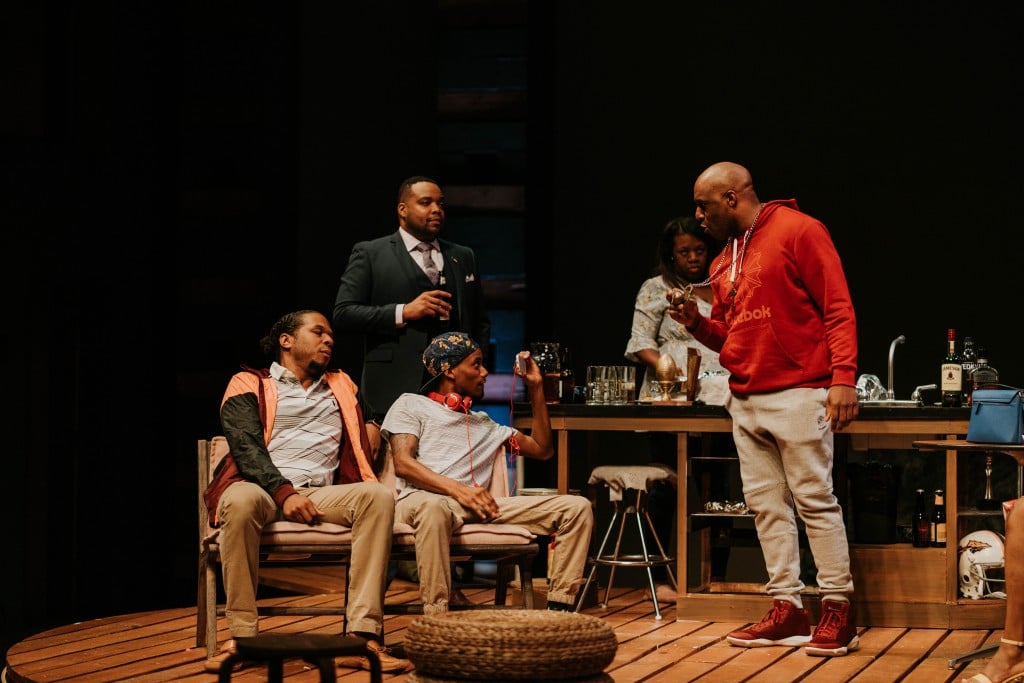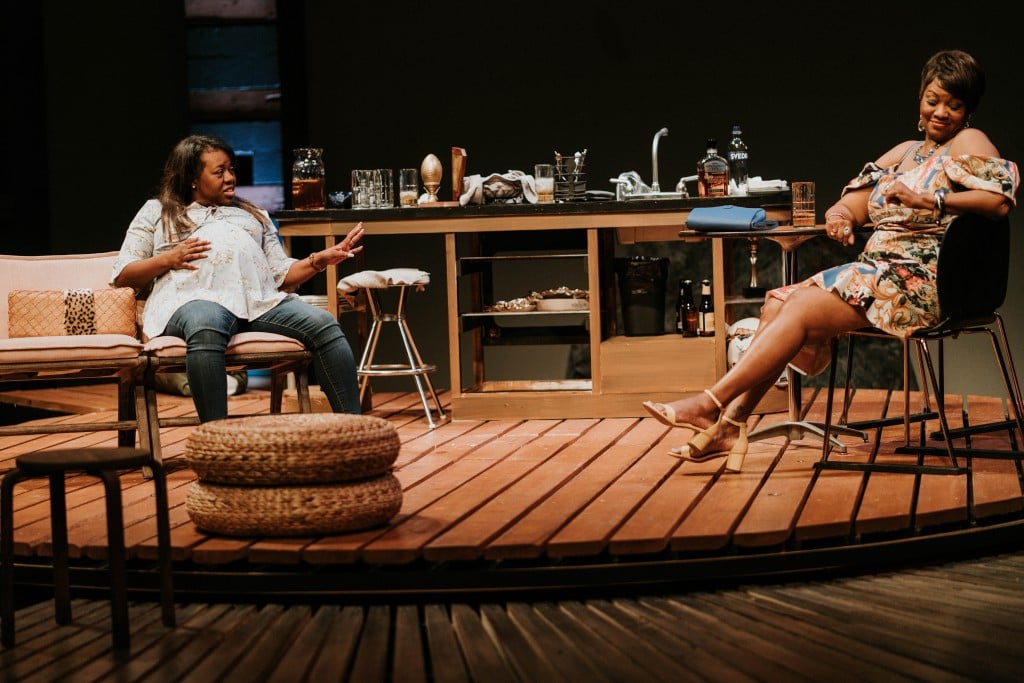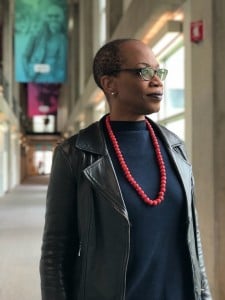Dallas Playwright Regina Taylor’s New Play Hits Close To Home
ArtandSeek.net April 27, 2018 31Raising a family in South Dallas can be difficult. Property taxes are rising, the neighborhoods are changing and gentrification seems to loom over the heads of working class families.
In this week’s State of the Arts discussion, Dallas native and acclaimed playwright Regina Taylor tells Art&Seek that housing insecurity and political polarity inspired her newest play.
Regina Taylor welcome back to Dallas and thanks for taking some time to chat.
Thank you so much.
So I want to talk about your new play ‘Bread.’ It’s about a financially struggling family from Oak Cliff who has a son entering adulthood and another in the womb about to enter the world. On top of that, there’s America’s political instability, the threat of gentrification and so many other things looming over this family’s head. Where did this narrative come from?
This narrative came from what’s happening in the world at this present moment. I started thinking about piece during the last elections. This play takes place just as the Obama’s are leaving office.
The parents are under 40 and they have one male son who’s about to go to college and they’re about to give birth to their second male son, but the wife is way overdue, because she’s afraid to push her hopes and dreams into this very unpredictable world.
‘Bread’ is about that which sustains, which nourishes us. Whether that’s spiritual or sustenance or money. And each person in the play is weighing the cost of the American Dream and trying to find out what’s going to work for them. And the elders are trying to impart that recipe onto the next generation.
Regina, you’ve brought up the American Dream. And your play is asking what is the cost of the American Dream. And I want to know why you felt that was an important question to pose to the audience?
It’s what’s on my mind right now. What is the state of the American Dream right now? I think this country’s very fractured. We haven’t seen this type of vocal and demonstrative division since the ’60s. That’s when people took to the streets to proclaim territory.
What needs to be let go of? And what needs to be held onto? That’s the conversation that’s at hand right now. And I think that theater is the perfect place for that discussion. Theater is that common ground. It bridges communities, generations and cultures together in a space. In the beginning of theater, you’d get together and gather around the fire and you’d tell your stories during harvesting season and communities would come together and share their journeys. It would let people know that they’re not alone in their journeys. Whatever side you stand on, whatever your stance is, I think that theater can provide that ground where we state those issues and those opinions and you don’t necessarily have to agree, but it gives an opportunity for people to feel empathy for the other side.
Some of the best American plays have been written about the hardest times – Women’s Lib, the Civil Rights Movement and the Great Depression – and I’m not sure this is one of those times. But I think things are hard for a lot of people right now. Why did you think it was important to write about this moment?
I write what’s on mind. I write about the questions I have about the world that I’m living in. And I write about myself. That’s where my plays begin. And I felt an urgency to set that down and to share.
In entertainment right now, we’re seeing a movement with African-American storytellers. There are folks like Donald Glover and Issa Rae who are having great years in television. And directors like Ava DuVernay and Barry Jenkins are bringing truly African-American narratives to the big screen. Do you think that’s happening in the American theater?
I think that we’re having a great surge of African-American voices – both male and female – across the board in American theater. There are more African-American writers having their shows produced across the country. And I find that to be very heartening and very exciting. You have various voices.
We always look at things in terms of black and white, but there are others from other walks of life who are American that we don’t talk about. We are a culture that is all encompassing and I think we need to start talking about those other voices as well.
Regina, you’re from Dallas. Would you mind telling me about growing up here and how that influenced the person you’ve become?
I grew up in a very segregated Dallas. I was born South of the Trinity. And that in of itself was also segregated. There was a separation between black and white, but also LatinX.
South of the Trinity, where my mother started out as a teacher, is where I was introduced to Latino culture. It was through my mother’s school though. Outside of that, it was segregated between brown people or people of color.
Then, when I really experienced integration on an intimate level was when I went to SMU. I gradated from L. G. Pinkston High School in West Dallas, then I took that bus ride over the Singleton Bridge that took me to the Greyhound bus station to transfer to a bus that would take me to Southern Methodist University.
It was the Meadows School of the Arts that introduced me to people that became lifelong friends. It was an island of integration in the midst of segregation and that’s how we got to know each other. I found that time in my life to be eye-opening and fascinating.
You’re an award-winning performer and playwright. Did you always know that you were going to be a storyteller?
Yes! I’ve been writing from as far back as I can remember. One of my earliest memories was being on the floor with crayons, paper and pencils writing children’s books. I may have been three of four years old and my mother’s hand was on top of mine.
It was the greatest gift that she gave me. She showed me how to navigate creativity, to embrace creativity, to start with the imagination and to chart a course. She showed me how to roll up my sleeves and how to work really hard to make my dreams come true. Those were life lessons that my mother gave me that taught me how to write.
Regina, when you’re writing, how much does your potential audience factor into what you’re writing?
I think that my writing comes from questions that I have and that I am wrestling with. I try to go outside of my perspective and to challenge my own thoughts. I want to challenge what I believe in. And that means you have to have conversations with people who have other thoughts. Thoughts that are contrary to your own. And then you put all of those onto the stage through the dialogue of the characters.
Because of that, I think people come to my plays and they’re surprised that they see themselves. You know the play is set here in Dallas. It’s set in South Oak Cliff and audiences from Dallas and to the surrounding places will come to Addison and they will recognize themselves and the people around them. And I find that truly exciting.
What does it mean to you to have a play about Dallas and about the things on your mind premier so close to home?
I needed to write something that was about where I’m from. From the soil that I come from. I needed to do that, so that I could see how I got to where I got right now and to imagine where I see things going. I needed to return to Dallas, in order to grapple with the issues on my mind. I’m very happy and proud that its premier is here and being produced for these audiences.
Interview questions and answers have been edited for brevity and clarity.














